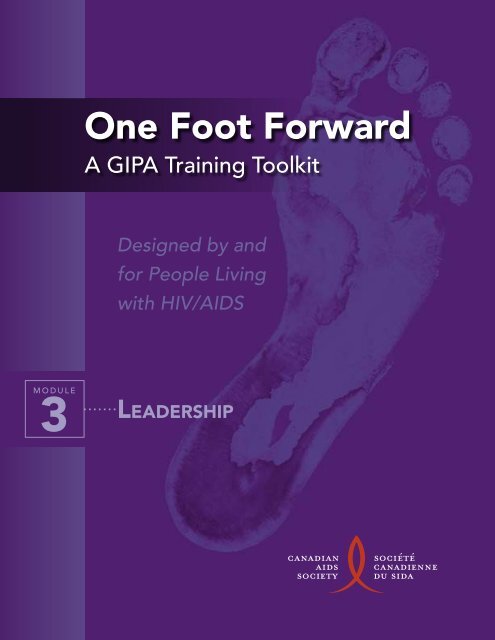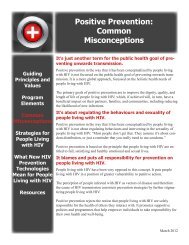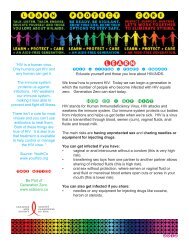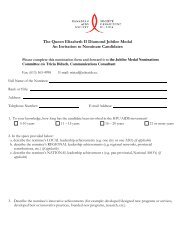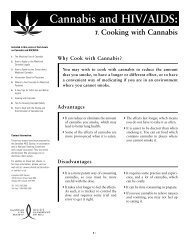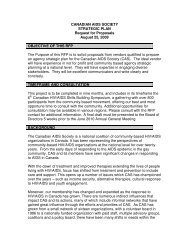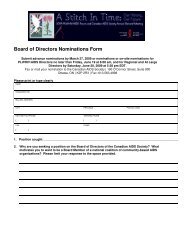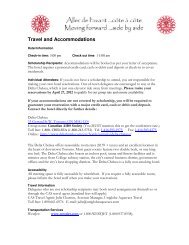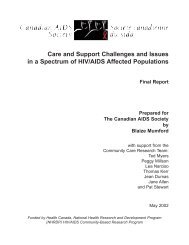One Foot Forward - Canadian AIDS Society
One Foot Forward - Canadian AIDS Society
One Foot Forward - Canadian AIDS Society
You also want an ePaper? Increase the reach of your titles
YUMPU automatically turns print PDFs into web optimized ePapers that Google loves.
<strong>One</strong> <strong>Foot</strong> <strong>Forward</strong><br />
A GIPA Training Toolkit<br />
Designed by and<br />
for People Living<br />
with HIV/<strong>AIDS</strong><br />
M O D U L E<br />
3<br />
. . . . . . .<br />
Leadership
<strong>One</strong> <strong>Foot</strong> <strong>Forward</strong><br />
A GIPA Training Toolkit<br />
Designed by and<br />
for People Living<br />
with HIV/<strong>AIDS</strong><br />
MODULE<br />
3 .......<br />
Le a d e r s h i p
............. On e Fo o t Fo r w a r d<br />
MODULE 3 — L e a d e r s h i p<br />
ii<br />
ISBN : 0-921906-57-9<br />
<strong>Canadian</strong> <strong>AIDS</strong> <strong>Society</strong><br />
190 O’Connor St. Suite 800<br />
Ottawa, ON K2P 2R3<br />
Telephone : 613-230-3580<br />
Toll Free : 1-800-499-1986<br />
Fax : 613-563-4998<br />
www.cdnaids.ca<br />
Printed in Canada
Leadership<br />
..........<br />
MODULE<br />
3<br />
Table o f Co n t e n t s<br />
Le a d i n g to What................................. 2<br />
Assessing Your Community ................................ 3<br />
Social Power ........................................... 4<br />
In f l u e n c i n g the In f l u e n c e r s ......................... 4<br />
Be i n g a Leader as a Pe r s o n Living w i t h HIV/<strong>AIDS</strong>.. . . . . . . . 7<br />
Step <strong>One</strong> .. . . . . . . . . . . . . . . . . . . . . . . . . . . . . . . . . . . . . . . . . . . . . . . . . . . . 8<br />
Step Two .. . . . . . . . . . . . . . . . . . . . . . . . . . . . . . . . . . . . . . . . . . . . . . . . . . . . 8<br />
Step Three .................................................... 8<br />
Me n t o r s a n d Me n t o r i n g ........................... 9<br />
Empowering New Leaders .. . . . . . . . . . . . . . . . . . . . . . . . . 11<br />
Li o n s a n d Ti g e r s a n d Gro u p s – Oh, My!. . . . . . . . . . . . . . . 11<br />
Forming .. . . . . . . . . . . . . . . . . . . . . . . . . . . . . . . . . . . . . . . . . . . . . . . . . . . . 12<br />
Storming .. . . . . . . . . . . . . . . . . . . . . . . . . . . . . . . . . . . . . . . . . . . . . . . . . . . 12<br />
Norming . ................................................... 13<br />
Ending .. . . . . . . . . . . . . . . . . . . . . . . . . . . . . . . . . . . . . . . . . . . . . . . . . . . . . 13<br />
To Talk o r No t to Talk .. . . . . . . . . . . . . . . . . . . . . . . . . . 13<br />
Basic Communication Skills . . . . . . . . . . . . . . . . . . . . . . . . . . . . . . 13<br />
Posture ...................................................... 13<br />
Listening .. . . . . . . . . . . . . . . . . . . . . . . . . . . . . . . . . . . . . . . . . . . . . . . . . . . 14<br />
Questions . .................................................. 15<br />
Reflective Language ........................................... 15<br />
Congruence .. . . . . . . . . . . . . . . . . . . . . . . . . . . . . . . . . . . . . . . . . . . . . . . . 16<br />
“Bad” Communication ......................................... 16<br />
Silence .. . . . . . . . . . . . . . . . . . . . . . . . . . . . . . . . . . . . . . . . . . . . . . . . . . . . . 16<br />
Meetings ...................................... 17<br />
Politicians a n d the Politics o f Politicians.. . . . . . . . . . . . . 19<br />
Speaking Up!.................................... 20<br />
Allies, Fr i e n d s a n d Building Relationships.............. 21<br />
O n e Fo o t Fo r w a r d<br />
iii
............. On e Fo o t Fo r w a r d<br />
Self Care .. . . . . . . . . . . . . . . . . . . . . . . . . . . . . . . . . . . . . 22<br />
Te r m s in this Mo d u l e ............................. 24<br />
Self Assessment .. . . . . . . . . . . . . . . . . . . . . . . . . . . . . . . . 25<br />
No t e s......................................... 26<br />
MODULE 3 — L e a d e r s h i p<br />
iv
Leadership<br />
..........<br />
MODULE<br />
3<br />
In this module, we’ll talk about leadership – what it means to be<br />
a leader; how you might influence your community without being<br />
manipulative; the different ways you lead; and offer some information<br />
on working with groups.<br />
ME<br />
Yes, YOU.<br />
“To get others to come into our<br />
ways of thinking, we must go<br />
over to theirs; and it is necessary<br />
to follow, in order to lead.”<br />
– William Hazlitt<br />
Welcome to the World of<br />
LEADERSHIP!<br />
You now have a bull’s eye painted on your forehead.<br />
“Why do I want to do this” you may ask yourself.<br />
“Am I crazy” Perhaps.<br />
“Am I a glutton for punishment” Maybe.<br />
“Am I concerned about my peers, other people living with HIV/<strong>AIDS</strong><br />
(PLWHIV/<strong>AIDS</strong>), and making things better for everyone”<br />
BINGO!<br />
If you believe that PLWHIV/<strong>AIDS</strong> in your community need to be more<br />
involved in the decision-making process and in helping to develop and<br />
guide programs and services, then you’re exactly where you ought to be.<br />
Keep reading.<br />
O n e Fo o t Fo r w a r d<br />
1
............. On e Fo o t Fo r w a r d<br />
Le a d i n g to Wh a t<br />
What does it mean to be a leader<br />
Definitions of “lead” are:<br />
1. To go before or with to show the way; conduct or escort;<br />
2. To conduct by holding and guiding;<br />
3. To influence or induce; cause; and<br />
4. To guide in direction, course, action, opinion.<br />
The word “lead” comes from an Old English word meaning “to go” or<br />
“to travel.” Leading is viewed by many people as being out in front of<br />
the group, taking charge of things and being responsible for making<br />
things happen.<br />
But if we look at leading as a process of guiding or influencing, then<br />
we can see it as not necessarily needing to be out in front, but more a<br />
concept of “traveling with.”<br />
MODULE 3 — L e a d e r s h i p<br />
Leadership IS:<br />
• listening;<br />
• asking;<br />
• responding;<br />
• following;<br />
• considering;<br />
• guiding;<br />
• mentoring; and<br />
• respecting.<br />
Leadership is NOT:<br />
• manipulation;<br />
• control;<br />
• bullying;<br />
• deceit or lying; and<br />
• cheating.<br />
Leadership is not so much about making things happen as it is about<br />
helping things to happen.<br />
2
Leadership ..........<br />
MODULE<br />
3<br />
Leadership is about a presence, not a position.<br />
And some of the best leaders are those who are quiet and listen.<br />
Exercise<br />
Put down this module, or pause the CD.<br />
Sit comfortably, wherever you are.<br />
Now, listen. Listen for one minute.<br />
What did you hear<br />
What sounds were near you A clock Your breath<br />
What sounds were beyond those sounds Traffic Creaking in your<br />
house<br />
Learn to really listen. Try this exercise once each day. It only takes a<br />
minute and you can do it wherever you happen to be. Pay close attention<br />
to what you hear. That’s what listening and hearing is about.<br />
Assessing Your Community<br />
Before you can start leading, you need to know your community and its<br />
needs.<br />
Who is your community Is it only PLWHIV/<strong>AIDS</strong> Is it their loved ones<br />
too Is it the street community The business community The gay<br />
community Other non-profits Different ethnic groups<br />
It gets complicated, doesn’t it<br />
You need to explore and discover. A community is a mosaic, a lot of<br />
pieces all put together reflecting different ways in which people live,<br />
work and play together. The only thing that we all have in common is that<br />
we’re unique.<br />
What does “community” mean to you<br />
What needs and interests do you hear about from other PLWHIV/<strong>AIDS</strong><br />
Are those needs and interests being met Is there a better way to meet<br />
needs and interests<br />
O n e Fo o t Fo r w a r d<br />
3
............. On e Fo o t Fo r w a r d<br />
Bring your thinking cap and imagination and seek out people. Ask them<br />
about their lives and their interests and listen carefully. This is when you’ll<br />
learn about what the community needs most. Then, you can figure out<br />
what needs to happen in order to make positive changes.<br />
Social Power<br />
Some people have greater power than others. In North America, white<br />
men traditionally hold the most social power. Our society is patriarchal in<br />
structure – men lead the way.<br />
But social power can be much more subtle. For instance, a social worker<br />
holds more power than the client. Where the majority is one gender,<br />
that majority will hold more social power. Where one ethnic group is the<br />
majority, that group will also hold more social power.<br />
Recognizing that social power imbalances exist doesn’t ease the pain<br />
of the imbalance. Shifting power imbalances is difficult work. People<br />
become used to the way things are and change is often met with<br />
resistance.<br />
Talking about social power can start that shift.<br />
In f l u e n c i n g t h e In f l u e n c e r s<br />
Influence comes from a Latin word meaning “to flow in,” like water.<br />
MODULE 3 — L e a d e r s h i p<br />
When we want to influence things around us, we are being like water,<br />
moving with a flow, instead of smashing against.<br />
Think about people you know who you consider to be influential.<br />
What qualities do they have Are they persuasive Are they pushy Are<br />
they convincing in the points they make<br />
We hear about politicians and people who are influential. Most often, we<br />
mean they are people who are good at persuading others to a different<br />
point of view – hopefully a good one that helps others.<br />
But influencing can be perceived as being manipulative or turning things<br />
your way because you want it your way.<br />
4
Leadership ..........<br />
MODULE<br />
3<br />
Manipulation, being deceitful to get your way, is never helpful. Even if<br />
you think your way is the best way.<br />
If you want to be an influencer and not a manipulator, you have to be:<br />
• clear about the facts and your intentions;<br />
• honest with yourself about what you are trying to accomplish; and<br />
• happy with whatever happens, even if it isn’t what you had in mind.<br />
It’s not about YOU.<br />
It’s about US.<br />
Knowing the facts means doing your homework and taking away the<br />
emotional side of the issue. The emotions are important, but they are not<br />
the broader picture. Leadership means being able to see the bigger issue.<br />
You have to know what you’re talking about and understand that others<br />
will most likely see things differently than you do. That’s okay – it helps<br />
you sharpen your point, so to speak.<br />
If you want to test your ideas about changes you’d like to see, find<br />
someone you trust and go over the issue with them. Talk to them about<br />
your thoughts and see what the response is. If they have questions about<br />
your ideas, that’s great! It means you need to learn more to be able to<br />
answer those questions.<br />
Never be afraid of questions. They help you learn.<br />
Being honest with yourself is a reality check. “Why is this issue important to<br />
me Is it only about me or are other people affected by the same issue”<br />
If it’s just about you, then it isn’t OUR issue – it’s yours. And you need<br />
to deal with your issues by yourself. Self-advocacy is as important<br />
sometimes as working for others, but in the area of “leadership,” it can’t<br />
be just about you.<br />
Be happy, regardless of the outcome. The only person you can really, truly<br />
change is you. You have no control over other people’s reactions and<br />
responses. If the outcome isn’t what you had hoped for, is it something you<br />
can live with If the answer is yes, terrific! If the answer is no, ask yourself<br />
why you can’t live with it and go back to the reality check.<br />
WHAT you influence may not be as important as WHO you influence.<br />
O n e Fo o t Fo r w a r d<br />
5
............. On e Fo o t Fo r w a r d<br />
Example<br />
You want to influence the direction of a program – let’s say a treatment discussion<br />
group. No one in the group is very happy. They suggest topics that don’t get<br />
covered and cover topics they don’t care about. You think the group is important,<br />
but you also believe that the staff person running the group isn’t really listening to<br />
the group.<br />
Who do you talk to The Executive Director<br />
No.<br />
The Board of Directors<br />
No.<br />
First, you talk to the person who runs the group, the staff person who isn’t<br />
listening. You need to influence that person somehow. Are they carrying out<br />
instructions from higher up Are they unsure about how to make the changes<br />
people are seeking<br />
What can you do to help that person so that everyone will benefit<br />
Going straight to the Executive Director could make the staff person<br />
angry or defensive. It’s only useful seeing the ED if the staff person<br />
refuses to hear you.<br />
MODULE 3 — L e a d e r s h i p<br />
Going to the board, if they are a governing board, won’t help because<br />
they don’t deal with day‐to‐day issues (you’ll learn more about different<br />
types of boards in a future module). It could also make the ED and<br />
the staff person angry. For a working board, there may be some minor<br />
benefit, but they are likely all involved in their own stuff. Going to the<br />
staff person or volunteer is the best plan.<br />
Make sure you have the backing of members of the group. Do they want<br />
to see change<br />
If they do, get the facts together, get the list of changes together and<br />
talk with the staff person about those suggestions and why they are so<br />
important to the group.<br />
6
Leadership ..........<br />
MODULE<br />
3<br />
Remember that it’s about the group and not about you. The group –<br />
your peers and clients of the agency – needs this change to make the<br />
group more effective.<br />
Effectiveness is something all agencies want. It looks good in reports,<br />
and it really is better for everyone.<br />
In this example, you have been a leader by following the wishes of<br />
your peers. You have shown leadership by seeking the best solution<br />
for everyone.<br />
Be i n g a Leader as a Pe r s o n Living w it h HIV/<strong>AIDS</strong><br />
There are many things that you as a person with HIV can do in your<br />
community. Discovering the avenues where potential for leadership exists<br />
is the tricky part.<br />
You can:<br />
• get on the board of directors of your agency;<br />
• become an expert in a particular area of work (e.g., treatments,<br />
peer support, substance use);<br />
• get on committees locally, provincially or even nationally (there’s<br />
a lot of temporary work that needs to get done);<br />
• be an advocate for issues experienced by people with HIV;<br />
• be a public speaker for HIV issues in your area; and<br />
• be willing to be interviewed about living with HIV by the media.<br />
Deciding your focus is very important. Think about your strong and weak<br />
areas, your interests, hobbies and passions.<br />
As a person seeking to lead, there are some things worth considering:<br />
• A person willing to take the lead sometimes has a steep learning<br />
curve. Are you open to learning a lot in a short period of time<br />
• A person willing to advocate and speak up can be a target for<br />
criticism. Can you develop a thick skin<br />
• A person willing to take on responsibility is sometimes asked to<br />
take on more responsibility simply because they’ll do the work<br />
that’s needed. Can you learn to say, “Not right now,” and look<br />
after yourself<br />
• A person willing to do public speaking or media work is openly<br />
positive in the community. How might that affect your family<br />
O n e Fo o t Fo r w a r d<br />
7
............. On e Fo o t Fo r w a r d<br />
• A person seen as an expert can sometimes be seen as a<br />
know‐it‐all, aloof and not like everyone else.<br />
• Sometimes you may not have the answers. Can you say, “I don’t<br />
know,” and be confident that it’s okay<br />
• Taking a leadership role can be stressful. Think about how you<br />
handle stress and how you can learn to manage stress.<br />
The positive payoffs in deciding to take on responsibility are many:<br />
• You’ll learn a lot.<br />
• You’ll meet people.<br />
• You’ll be involved and active.<br />
• You’ll be contributing to improving your community and the lives<br />
of your peers.<br />
• You’ll be helping your agency.<br />
• You’ll gain confidence the more involved you become.<br />
• You’ll feel good about yourself.<br />
Step <strong>One</strong><br />
You’ll need to look around and see what’s available.<br />
Ask staff people questions, meet with a board member, talk with your<br />
peers and think about your options.<br />
Step Two<br />
Put your name forward for the work.<br />
MODULE 3 — L e a d e r s h i p<br />
8<br />
For a board position, you may have to wait until the next Annual General<br />
Meeting or you may be appointed, if there are open seats.<br />
For a volunteer program, you may have to wait until training starts.<br />
If you’re interested in paid employment, you’ll have to keep your ears open<br />
for job postings and determine whether you have the skills for the position.<br />
Step Three<br />
Jump in!<br />
The best way to learn a new skill is to get into it. You can read all you<br />
like, but until you’re into the work, you won’t know all the aspects that
Leadership ..........<br />
MODULE<br />
3<br />
will arise. Every group and program is different – culturally and in the way<br />
they do their work.<br />
• Don’t worry that you don’t know it all – you’ll never know<br />
everything.<br />
• Don’t wait until it’s perfect – it’ll never be perfect.<br />
• Don’t wait for someone to ask you – you’ll be waiting a long,<br />
long time.<br />
Me n t o r s a n d Me n t o r i n g<br />
A mentor is a person who can guide you and help you learn. Mentors do<br />
not find you – you must find them.<br />
If you think you’d like a mentor, you’ll need to do a lot of listening and<br />
watching. This is a relationship you are trying to develop with someone<br />
you respect and who respects you and your ability.<br />
A mentor is not a person who will tell you what to do or not do – that’s<br />
your job. A good mentor relates their experiences, provides you with<br />
suggestions and asks you questions that make you think.<br />
A mentor will also challenge you. Being challenged to try new and different<br />
things, as well as difficult things, is a way to help you grow and develop. At<br />
some point, the mother bird pushes the babies out of the nest.<br />
You can learn to fly and a mentor can help you spread those new wings.<br />
Here are some things to think about.<br />
Qualities you might admire:<br />
• honesty;<br />
• respectfulness;<br />
• approachability;<br />
• receptivity;<br />
• attentiveness to people;<br />
• humourousness;<br />
• straightforwardness;<br />
• cooperativeness;<br />
• reliability;<br />
• supportiveness; and<br />
• forthcomingness.<br />
O n e Fo o t Fo r w a r d<br />
9
............. On e Fo o t Fo r w a r d<br />
What qualities do you admire in a person (e.g., honesty,<br />
straightforwardness, etc.)<br />
What qualities do you admire in yourself<br />
What skills do you want to improve (e.g., computer skills, meeting<br />
organization skills, writing skills)<br />
What new skills do you want to learn<br />
Who in your community, agency or peer group do you admire<br />
MODULE 3 — L e a d e r s h i p<br />
What is it about that person that you admire<br />
What do you think that person could offer you learning-wise<br />
Now you have a basic starting point from which you can approach a<br />
potential mentor.<br />
10
Leadership ..........<br />
MODULE<br />
3<br />
Ask that person out for coffee and talk about what you’d like to be doing<br />
in your agency (e.g., serving on the board or volunteering). You can let<br />
them know that you’d like to “pick their brain” over issues and learn<br />
more about their opinions or their experiences in a certain area.<br />
Don’t be hurt if they can’t offer you too much time, but do be persistent.<br />
It’s very flattering when someone values our ideas and thoughts: we feel<br />
good about being able to help another person.<br />
If you want to mentor someone, look around you. Is there a new person<br />
getting involved in the agency who you think has potential You might<br />
want to talk to them about what they want to do and help them learn<br />
more to reach their own goals.<br />
Remember, a person you look up to started exactly where you are now.<br />
They had to learn from others as they went along.<br />
They also learned from their mistakes. Never be afraid to make mistakes<br />
– that’s how we all learn.<br />
Empowering New Leaders<br />
This tool kit was primarily developed for people who are new to the<br />
work. But at some point, you will find yourself being approached by<br />
another new person to be a mentor.<br />
When you’re ready, you’ll be able to assist others in gaining the skills<br />
they need and in developing their abilities so they can try new and<br />
challenging things. You’ll be pushing your own babies out of the nest.<br />
Make space for new people and new ideas – that’s where we all start.<br />
Li o n s a n d Ti g e r s a n d Gro u p s – Oh, My!<br />
While you may prefer working on your own, at some point, it’s likely that<br />
you will be working with a group. Whether it’s a through a committee,<br />
the board, other volunteers, staff or your peers, groups are a way to<br />
bring together many minds to work on common issues.<br />
Because groups are made up of different people with different ideas,<br />
they can sometimes feel intimidating or overwhelming.<br />
Not to fear!<br />
11<br />
O n e Fo o t Fo r w a r d
............. On e Fo o t Fo r w a r d<br />
Most people in the group are probably feeling the same way you are.<br />
Groups have a life cycle – they change and grow and sometimes die off.<br />
Within that life cycle, there are several common stages. These are the<br />
“forming, storming, norming” cycles.<br />
Forming<br />
This is the beginning of the group. People don’t know each other and<br />
there is a process of learning about the various personalities in the<br />
group. Some are outgoing, others are shy, some are thoughtful, others<br />
are passionate. It takes time for relationships<br />
“Not even a great leader can<br />
get very far without great<br />
people to lead.”<br />
– Ashleigh Brilliant<br />
to develop in groups. Hopefully, the group<br />
is around long enough for that process to<br />
unfold easily.<br />
When a group is short-lived, such as a<br />
committee, there isn’t always time to develop<br />
relationships. In those groups, people<br />
are usually working on one or two tasks over a brief period. In that<br />
situation, you’ll need to jump in and get your feet wet! Don’t be afraid<br />
to offer opinions and thoughts – that’s why you’re there.<br />
Storming<br />
The second stage for group development is the “brainstorming” period.<br />
This is when people are involved in the work of the group. It may include<br />
discussion; it may involve planning or organizing. Whatever the work, this<br />
is when the particular strengths of the group members can shine.<br />
MODULE 3 — L e a d e r s h i p<br />
All group members should be encouraged to use their particular abilities<br />
to advance the process and get the work done. Each person needs to be<br />
involved, which is not easy for shy, quiet people.<br />
If you notice a person is not contributing, you can ask them what they<br />
think. Sometimes the quiet ones have brilliant ideas percolating in their<br />
minds. Asking them to speak up and to contribute makes sure that<br />
everyone at the table is involved.<br />
In a teleconference or committee, it’s more difficult. Often people need<br />
to jump into the conversation to get their ideas out. Look for a break in<br />
the talking to make your point.<br />
12
Leadership ..........<br />
MODULE<br />
3<br />
Norming<br />
This is when the group settles into itself. People will feel more<br />
comfortable about their role in the group and a natural flow will start to<br />
happen. This works for longer term groups, but not always in short-term<br />
groups.<br />
In short-term groups, there may not be time to get to this stage. But<br />
even on teleconferences, or with groups that have more than one or<br />
two meetings, there will probably be a time when people become<br />
comfortable with their own level of contribution and aware of how the<br />
others in the group like to be involved.<br />
Ending<br />
Ending a group is a period when people have the chance to reflect,<br />
not only on the group’s work, but on their own work. It’s important for<br />
a group to celebrate its successes and to recognize contributions of all<br />
group members, even in short-term groups and committees.<br />
Hopefully, you will leave a group process feeling good about what you’ve<br />
done and comfortable with your involvement. Others should feel good<br />
too.<br />
To Talk o r No t to Talk<br />
Basic Communication Skills<br />
Communication is 20% verbal and 80% non-verbal.<br />
That means that most of what we learn through communication is<br />
expressed through what we see, not what we hear.<br />
Body language is what our faces, hands, torsos, legs and feet are doing<br />
while we are talking or listening. We can learn to read some body<br />
language, but there are many variables that may cause us to misinterpret it.<br />
Posture<br />
Open posture: when a person is sitting or standing relaxed with their<br />
torso exposed – with no fidgeting. Legs may be crossed or uncrossed,<br />
but the arms are not covering the chest. An open posture usually shows<br />
that a person is paying attention and is present in the conversation.<br />
13<br />
O n e Fo o t Fo r w a r d
............. On e Fo o t Fo r w a r d<br />
Closed posture: when a person is sitting or standing and their torso<br />
is covered. Legs are usually crossed and the arms are crossed over the<br />
chest. Usually, this means a person is feeling defensive, or is otherwise<br />
not open to the conversation, for any number of reasons. But, the person<br />
may have cold hands and may be keeping them warm.<br />
Fidgeting: when a person is moving their feet, hands or fingers during a<br />
conversation, or even playing with a pen or biting nails. It could indicate<br />
that the person is nervous or not interested in the discussion. But, a<br />
person may rub their chin as they are thinking.<br />
Listening<br />
If you want to be a good communicator, learn to listen. Listening is not<br />
easy; it takes focus. You must be completely involved in what the other<br />
person is telling you. That means quieting the many voices that go on in<br />
your head.<br />
Think about a movie or TV show you really like, or a book you got totally<br />
lost in. When you watched that show or read that book, what happened<br />
for you You managed to pay attention and keep the distractions away.<br />
If you really want to listen to another person, you can try to think about<br />
listening to them in the same way – completely lost and fascinated by<br />
their story.<br />
MODULE 3 — L e a d e r s h i p<br />
When you’re listening, sit comfortably in an open posture with your torso<br />
exposed, legs crossed or uncrossed. You can lean forward a little, which<br />
puts you even more into the conversation. If you notice your arms folding<br />
over your chest, quickly survey your mind. Am I losing interest or losing<br />
focus Be purposeful and try to keep your arms open. You’ll find you<br />
actually hear better! And put down any distractions, like pens or papers.<br />
This will help your whole body be involved in the process.<br />
As you listen to someone, try to acknowledge what you’re hearing.<br />
You can do this by nodding in understanding, saying “Uh‐huh” and<br />
by leaning in to get closer to the person talking. Do anything that lets<br />
the person know you are paying attention. It may take practice at first,<br />
but eventually, letting another know that you are listening carefully will<br />
become an easy habit.<br />
14
Leadership ..........<br />
MODULE<br />
3<br />
Questions<br />
There are two types of questions:<br />
Open: any question that asks a person to offer information.<br />
Example: What do you think about...<br />
Closed: any question that will get you a one-word response.<br />
Example: Do you like broccoli<br />
We use questions to get information. Open questions encourage<br />
exploration of a topic, while closed questions encourage others to be<br />
direct and to the point.<br />
Another phrase that’s helpful in getting information is, “Tell me about...”<br />
It makes room for the person to tell us a story about their thoughts,<br />
feelings and ideas. But be prepared to listen! Don’t get involved in a<br />
conversation or discussion when you are tired, not interested, or not able<br />
to be fully present for the person.<br />
Reflective Language<br />
When you want to verify with a person that you understand them clearly,<br />
you can use reflective language. Put in YOUR own words what you’ve<br />
heard and what it means to you.<br />
Example: “I heard you saying that you liked the meeting this morning,<br />
but that it seemed a little too long.”<br />
This allows the person to confirm or correct you and helps to clarify what<br />
you’re hearing.<br />
Don’t “parrot” the person, repeating exactly what was just said. Put it in<br />
your own words.<br />
This is not a skill learned overnight. You need to practice it over time.<br />
O n e Fo o t Fo r w a r d<br />
15
............. On e Fo o t Fo r w a r d<br />
Congruence<br />
When you compare words and body language, you can determine<br />
congruence. Are you hearing the same thing you’re seeing If a person<br />
tells you they feel wonderful, but they look depressed, with their<br />
eyebrows knitted, there is a contradiction. It’s okay to check it out with<br />
them. “Are you sure you’re okay You look concerned about something.”<br />
This lets the person either confirm or correct. And we accept whatever<br />
answer we get.<br />
If a person seems uncomfortable or distracted in the conversation, or<br />
if you are feeling uncomfortable, for any reason, don’t feel bad about<br />
delaying the conversation to another time.<br />
It’s better to wait for another chance to talk than stick with it when you<br />
really aren’t present or the other person seems distracted.<br />
“Bad” Communication<br />
There really isn’t any bad communication. When we aren’t talking, we are<br />
communicating that we don’t want to be connected. However, abusive<br />
language is NOT okay, and if a person is verbally abusive, don’t get mad<br />
– get out. Responding to abusive language with more abusive language<br />
is adding fuel to a fire. Don’t fan the flames, just leave.<br />
Silence<br />
MODULE 3 — L e a d e r s h i p<br />
Silence, something North Americans are not comfortable with, can<br />
communicate disinterest, or it can be used as a way to simply “be”<br />
together. We don’t have to fill up the airspace with talk.<br />
16
Leadership ..........<br />
MODULE<br />
3<br />
Meetings<br />
Meetings are useful for several purposes:<br />
• relaying information;<br />
• learning new information;<br />
• developing plans together; and<br />
• making sure that action is taking place.<br />
Meeting for the sake of meeting can feel like a waste of time and energy.<br />
When we plan meetings, we need to think about several things to make<br />
them useful:<br />
1. What are we meeting for - The purpose.<br />
2. Who needs to be there - The people.<br />
3. What will be the result of the meeting - The plan.<br />
It’s always good to create an agenda for meetings.<br />
Agendas help people remain focussed on the issues<br />
at hand. They are maps for the meeting that list<br />
topics for discussion and debate.<br />
Sometimes, each item is given a specific amount of<br />
time to be covered, especially when planning and<br />
implementing actions are involved. At other times,<br />
agendas are open to allow for more discussion.<br />
No man will make a<br />
great leader who wants<br />
to do it all himself, or<br />
to get all the credit for<br />
doing it.<br />
– Andrew Carnegie<br />
You can create an agenda at the start of the meeting, if everyone<br />
agrees to it, but it’s important that an agenda be followed once it’s set,<br />
otherwise the group can drift and get off track.<br />
Do your best to keep to the agenda. Be alert to side‐tracking and don’t<br />
be afraid to point it out tactfully when it occurs. Everyone has the shared<br />
responsibility for keeping things on track, not just the facilitator.<br />
If you are responsible for contacting people for the meeting, make sure<br />
you have the correct information for everyone who should attend. Most<br />
people use email these days, but phoning may be needed to invite<br />
others.<br />
Providing a meeting reminder a couple of days before the meeting is<br />
helpful too.<br />
O n e Fo o t Fo r w a r d<br />
17
............. On e Fo o t Fo r w a r d<br />
Facilitating a meeting means assisting people to move through the<br />
agenda and helping to keep things on track.<br />
Facilitate means to make easy. Facilitators don’t lead a meeting, they<br />
guide it in moving forward.<br />
When you’re facilitating a meeting you need to know:<br />
• the agenda for the meeting;<br />
• the amount of time for the meeting;<br />
• who’s going to be attending the meeting; and<br />
• outcomes that are expected from the meeting.<br />
Your job as facilitator is to keep things moving.<br />
Every group has members who are outgoing and contribute a lot. Other<br />
members may be quiet and not contribute as much. The latter need to<br />
be encouraged to contribute. Simply ask them for their ideas.<br />
If you are facilitating a large meeting, you may need to keep a speakers’<br />
list. Ask people to raise their hand if they want to speak and note their<br />
names in sequence. This helps keep some order.<br />
If you start to hear repeated points of information, you can ask the group<br />
if there is anything new to add. It’s okay as facilitator to suggest that the<br />
group make a decision or move to the next agenda item.<br />
It’s often appropriate to keep a record of the meeting’s decisions and<br />
outcomes in the form of minutes. Make sure someone is appointed by<br />
the group to record the minutes.<br />
MODULE 3 — L e a d e r s h i p<br />
You may be asked to provide a facilitator’s report after the meeting. Try<br />
to prepare any report no more than two days after the meeting, so it will<br />
be fresh in your mind.<br />
18
Leadership ..........<br />
MODULE<br />
3<br />
Politicians a n d t h e Politics o f Politicians<br />
If you want to meet with a politician, there are important things to<br />
remember:<br />
• Politicians are very busy and are asked to meet with many<br />
people.<br />
• Meetings with politicians must have a very clear purpose.<br />
• Politicians hate surprises, so make sure they have lots of<br />
information before you meet.<br />
Most importantly, politicians are PEOPLE – they have feelings, ideas and<br />
opinions, just like you do. Here are some points that we will cover with<br />
regards to meeting politicians:<br />
• scheduling and preparing for the meeting;<br />
• public speaking (options, lived experience, etc.); and<br />
• finding allies/building relationships.<br />
You can prepare a “brief” for a meeting with a politician. A brief outlines<br />
the information you want to discuss and all the facts, statistics and<br />
background that will help the meeting move along.<br />
Some briefs can be long with lots of information, but covering the key<br />
points will probably be enough. Providing too much information will turn<br />
people, including politicians, off.<br />
When you call or write a letter to request a meeting with a politician,<br />
you’ll probably talk to an assistant. Respectfully explain why you’d like to<br />
meet with the politician.<br />
Be understanding, recognizing that politicians don’t have a lot of time<br />
to meet, but that they’re interested in the concerns of their constituents.<br />
Ask for only as much time as you think you need. A half hour meeting<br />
might not seem like much, but it will “get your foot in the door” and may<br />
lead to future meetings.<br />
When you meet, keep your message clear and to the point.<br />
Allow the politician to ask you questions about the issues.<br />
Be prepared to say, “I don’t know,” if you don’t know (it’s okay –<br />
politicians don’t know everything either). You can always forward them<br />
the information later.<br />
O n e Fo o t Fo r w a r d<br />
19
............. On e Fo o t Fo r w a r d<br />
If you have a specific request of the politician, don’t make it AT the<br />
meeting. Again – no surprises – make sure the person knows the request<br />
well before the meeting.<br />
Thank the politician for meeting with you – they’ll appreciate it and it<br />
shows respect. If you want, you can ask for a meeting in the future to<br />
continue the discussion.<br />
And if the politician sees you as a resource for information about an issue<br />
of importance, they may keep in touch with you.<br />
It’s a good idea to follow up on your meeting with a letter or an<br />
email summarizing the discussions, including areas of agreement and<br />
disagreement and listing any further actions that need to be taken.<br />
Speaking Up!<br />
This module will not give you all the techniques of public speaking, but if<br />
you are interested in that, there are options you can explore.<br />
Most agencies have a “speakers’ bureau”. This is a group of people that<br />
provides speaking engagements for the <strong>Society</strong> on various topics (e.g.,<br />
<strong>AIDS</strong> 101 and poverty and <strong>AIDS</strong>).<br />
It is important that PLWHIV/<strong>AIDS</strong> talk about their lives and experiences.<br />
From a lived experience, the audience can learn a lot more about living<br />
with HIV than they can from books, videos or speakers who are not living<br />
with HIV.<br />
MODULE 3 — L e a d e r s h i p<br />
Sharing experiences can be very powerful – and scary – for people. But,<br />
it can also be very gratifying. There’s no way to know how an audience<br />
will respond, which can be exciting, but if people in attendance have<br />
negative opinions about people with HIV, it can be a challenge.<br />
If you are going to do a talk, find out these things:<br />
• What’s the topic<br />
• Who is the audience<br />
• How long do you talk for<br />
• What are the learning goals<br />
20
Leadership ..........<br />
MODULE<br />
3<br />
You also need to think about your presentation:<br />
• Do I need special equipment<br />
– Video/DVD player, flip charts, PowerPoint, etc.<br />
• What is my outline<br />
– This is the agenda you create for yourself.<br />
– Think about it like a story: there is a beginning, middle and end.<br />
• Do I want to include dramatic effect<br />
– Maybe there are games or exercises to make the talk more<br />
interesting. You may not talk about your sero‐status until<br />
the very end. That takes the audience by surprise and often<br />
moves them deeply.<br />
• Will I use evaluations<br />
– Quick and easy evaluation forms with only a few questions<br />
can give you a good idea of how you did and where you<br />
can improve.<br />
– Never look at negative comments in a bad way. They help us<br />
grow and improve our presentations.<br />
And don’t be afraid to take risks! Try something new if you have an idea.<br />
It may work well and it may flop, but you never know unless you try.<br />
Allies, Fr i e n d s a n d Building Relationships<br />
When we think about a leadership role, we need to think about<br />
relationship.<br />
Allies are people who can help us and who we can help. You’ll know allies<br />
when you meet them: they share the same philosophy, ideas and strive<br />
for the same purpose.<br />
Allies aren’t to be used. Like we said at the beginning of this module,<br />
genuine leaders don’t manipulate for their own goals.<br />
Developing relationships takes time.<br />
The more you get to know the group<br />
you’re working with, the more you will<br />
recognize the most supportive people,<br />
as well as those you may not be able<br />
to work with.<br />
“I suppose leadership at one time<br />
meant muscles; but today it means<br />
getting along with people.”<br />
– Indira Gandhi<br />
O n e Fo o t Fo r w a r d<br />
21
............. On e Fo o t Fo r w a r d<br />
We won’t always like everyone and everyone won’t always like us. That’s<br />
okay – it’s part of being human.<br />
Rather than dwelling on relationships that don’t work, invest your time<br />
and energy in those that are useful.<br />
Go for coffee.<br />
Go for a walk.<br />
Invite them over for supper.<br />
The best ideas and relationships connect people through the simplest<br />
things.<br />
Just get connected.<br />
Self Care<br />
Self care is the most important aspect of our work and the one we pay<br />
the least attention to.<br />
Self care means being kind to ourselves and making sure that we remain<br />
healthy in mind, soul and body. We all have our own way to take care of<br />
ourselves; the most important thing is that we DO IT.<br />
MODULE 3 — L e a d e r s h i p<br />
No one wants to burn out and no one wants you to burn out. Burn out<br />
simply means we are completely worn out and used up. We have no<br />
energy to do the work and we can even lose interest in the things that<br />
make us feel good.<br />
Avoiding burn out means paying attention to yourself: your body, your<br />
mind, your emotions and your spirit.<br />
Everyone experiences burn out differently, but some common warning<br />
signs include:<br />
• memory loss – “ Oops, did I forget to do that”<br />
• irritability – “Get off my case and shut up!”<br />
• crying – because you’re exhausted<br />
• fatigue – all the time, not just after running a marathon<br />
• lack of interest in fun stuff – “Maybe later...”<br />
22
Leadership ..........<br />
MODULE<br />
3<br />
• lack of emotional feelings – numbness<br />
• lack of sleep – “Just ten more minutes on snooze...”<br />
• lack of concentration – “What was I doing and why was I doing<br />
it”<br />
If your gut is telling you that you’re doing too much, listen to it! We have<br />
gut reactions and often dismiss them. Pay attention to YOU and you’ll get<br />
the messages that you need to know when to slow down or pull back.<br />
And be honest with others about how you’re doing. It’s much better to<br />
be up front about your ability than to be a good soldier and keep going<br />
until you drop.<br />
How do you care for yourself<br />
q walk my dog<br />
q listen to music<br />
q cook good food<br />
q play with my children<br />
q go for a run<br />
q work out at the gym<br />
q read<br />
q watch TV<br />
q practice yoga<br />
q go to the movies<br />
q pray, meditate<br />
q play music<br />
q paint, draw, make art<br />
q rearrange my furniture<br />
q play on the computer<br />
(internet, games, etc)<br />
q go dancing<br />
q go shopping<br />
q have coffee with friends<br />
q chat on the phone<br />
Can you add to this list<br />
As long as you are doing something for yourself that feels good for you,<br />
it’s a good thing.<br />
Every day, try to have some time for yourself. It’s not selfish, it’s selfpreservation.<br />
There’s no agency or work on the planet that is more<br />
important than YOU.<br />
And if you don’t look after yourself, who will<br />
O n e Fo o t Fo r w a r d<br />
23
............. On e Fo o t Fo r w a r d<br />
Te r m s in t h i s Mo d u l e<br />
Agenda: From a Latin word meaning “that which is to be done,”<br />
agendas keep meetings focussed on the work to be accomplished. It is<br />
usually a list of items that need to be covered.<br />
Board of Directors: The group of volunteers in an agency that provides<br />
leadership to the agency and ensures it is operating in an accountable<br />
way.<br />
Committee: A group that meets to do particular work, which is often,<br />
but not always, associated with the work of the board. Committees are<br />
discussed more in the Boards and Governance module.<br />
Executive Director: The most common lead staff person in an agency,<br />
who is also often referred to as the “ED.”<br />
MODULE 3 — L e a d e r s h i p<br />
24
Leadership ..........<br />
MODULE<br />
3<br />
Self Assessment<br />
After completing this module, I learned:<br />
I still need more information about:<br />
My strongest areas right now are:<br />
My weakest areas right now are:<br />
My next steps will be:<br />
I can complete my next steps by:<br />
Rate the statements below by circling the number that you think fits.<br />
Very<br />
Need to work<br />
confident<br />
on this<br />
I spent enough time on this module. 1 2 3 4 5<br />
I’m using my energy wisely. 1 2 3 4 5<br />
I know where to find more information. 1 2 3 4 5<br />
I can find a person to help me out. 1 2 3 4 5<br />
I know how to apply what I learned. 1 2 3 4 5<br />
O n e Fo o t Fo r w a r d<br />
25
............. On e Fo o t Fo r w a r d<br />
No t e s<br />
MODULE 3 — L e a d e r s h i p<br />
26
Leadership ..........<br />
MODULE<br />
3<br />
No t e s<br />
O n e Fo o t Fo r w a r d<br />
27


